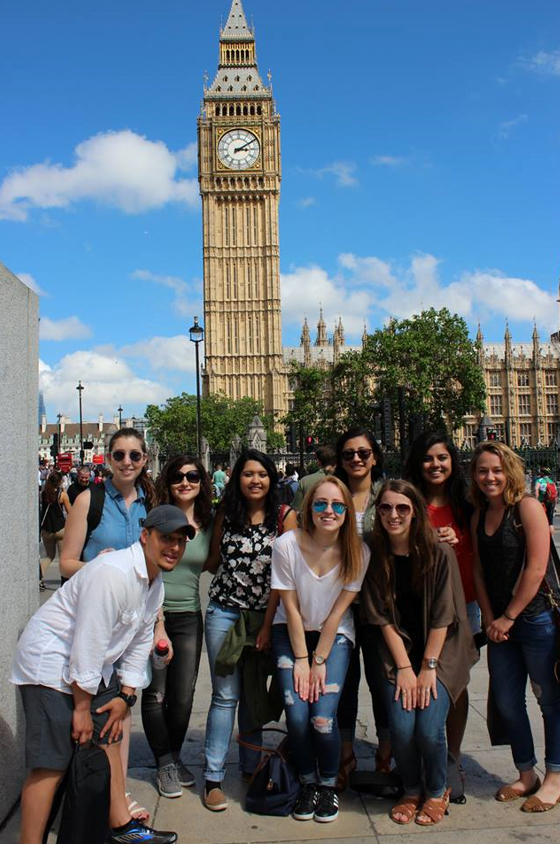Funding opportunities and scholarships, such as The Gilman Award, make study abroad more accessible. Contrary to popular belief, study abroad is available to all students regardless of financial background. Hayley McCoin, a student at University of Texas at Austin is a recipient of The Gilman Award and is participating on a faculty-led program in London through her university. Hayley is passionate about spreading awareness for funding opportunities to students who think that they may be unable to afford to study abroad.
I’m not here to talk to you not about the glitz and glamour of studying abroad. And, I’m also not here to tell you about all the things I discovered about myself while studying abroad. Instead, I’m here to talk to you about the one thing students seldom talk about when discussing their study abroad experience – the price.
It’s easy to get caught up in the pictures, blogs, and experiences of classmates. However, it’s no secret that studying abroad is incredibly expensive. For example, program costs are often double or even triple the tuition of a regular semester at a public American university. Too often I hear classmates and friends telling me how they would have loved to spend a semester intensively studying a language, or discovering a foreign city. However, they simply couldn’t afford to take off time from work or pay the additional fees.
I too faced financial limitations but I’m here to tell you about some of the ways that I was able to study abroad debt free.
Increasing American students studying abroad
Each year, more and more American students are studying abroad. People are discovering the value of international experience for a professional career. However, the cost of study abroad programs makes it seem as though study abroad is a privilege reserved for those without financial burden or constraint. Over the years, study abroad programs, as well as government agencies and private companies have become interested in diversifying the community of American students who are able to study abroad through scholarship and grant support. Today, more students from a range of income levels are empowered to study abroad. I’m happy to say that I fall into this group.
Setting goals
Studying abroad has always been a dream of mine. However, to complete my degree I was required to study abroad. During my Junior year as an International Relations and Arabic major at the University of Texas at Austin, I was determined to focus on my Arabic study by studying in an Arabic-speaking country. Unfortunately, any program that allowed me to do so was more than double UT tuition ($17,000 for a semester, to be exact). I set a goal to entirely fund my study program through a scholarship rather than loan. The semester prior to my semester abroad was full of scholarship applications, interviews, waiting, and more waiting. I was awarded a few of the scholarships that I had applied to. This achievement meant that I could travel to Jordan without worrying about the price of the experiences necessary for my cultural enrichment and language immersion.

The Gilman Award
The largest portion of my funding came from the Benjamin Gilman Award. The Gilman Scholarship aims to encourage intercultural dialogue and education through international study and in particular supports students receiving the Pell grant – a need-based government subsidy that assists students with documented financial need in paying for their college tuition. The Gilman Scholarship award amount depends on the study abroad program. Awards are offered to students up to $8,000. AIFS also offers an additional $500 to its students who receive a Gilman Award. This means that students could study abroad entirely debt free!
Finding funding
There are a range of scholarships available like the Gilman Award. The first step is researching what is out there and finding the scholarships relevant to you and your program of choice.
- Government-funded Scholarships: https://studyabroad.state.gov/us-government-resources/programs/programs-us-undergraduate-and-graduate-students
- Scholarships for Minorities: https://www.goabroad.com/articles/scholarships-abroad/5-more-scholarships-for-underrepresented-students
What I gained from studying abroad:
I’m currently studying at King’s College for the summer through an AIFS Customized Faculty-Led Program. The program focuses on the US, UK, and the World Order. This is my second study abroad experience as an undergraduate student. I would have never imagined that I would be finishing my undergraduate career studying history and government by some of the world’s leading experts. I started college avoiding opportunities that seemed financially impossible – study abroad, unpaid internships, etc. My first study abroad experience helped me gain the confidence in my ability to seek out the opportunities that seemed out of my reach. These experiences have been vital to my own personal enrichment. Thanks to AIFS, I have been able to embark on another life-changing experience. I knew that I was fully deserving and able.
Funding your study abroad experience can be stressful and at times scary. However, I’m here to tell you that no student should have to miss out on the sort of personal growth which comes from study abroad. No student should be put off because of the fear of financial constraints. Fortunately, programs like the Gilman Award are making study abroad more accessible and are leveling the playing field for all.
Hayley McCoin is finishing up a degree in International Relations and Global Studies from the University of Texas at Austin. UT Austin and the Clements Center for National Security offer their faculty-led May Term program: The US, UK and World Order at King’s College with support from AIFS.
